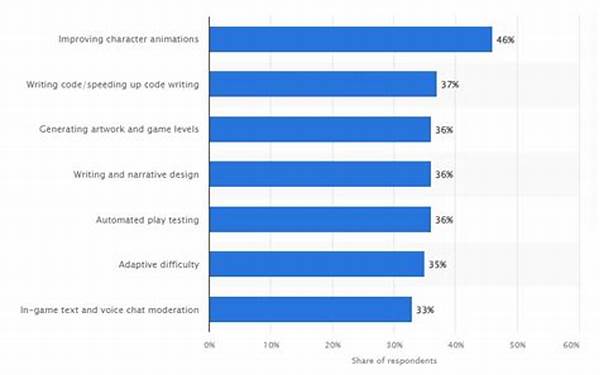How AI Supports Game Developers Worldwide
Read More : Why Ai Typography Tools Are Trending
Artificial Intelligence (AI) is no longer a futuristic concept reserved for sci-fi novels and movies—it’s a vital tool revolutionizing industries across the globe. Among its many applications, AI is making a significant impact in the gaming industry. From rendering lifelike graphics to creating immersive experiences, game developers are using AI to push the boundaries of creativity and functionality. This digital transformation is not just a technical evolution but also a creative revolution, offering endless possibilities for developers to explore new dimensions in game design. But how exactly is AI aiding game developers worldwide, and what makes it so impactful? AI tools enable game developers to automate repetitive tasks, optimize game environments, and even predict player behavior to enhance user experiences. By integrating AI, developers can focus more on creative aspects, ensuring they’re not caught up in mundane tasks. This paradigm shift opens doors to new storytelling methods, interactive gameplay, and operational efficiencies that were once thought impossible. However, the utilization of AI in game development goes beyond just creativity and efficiency; it also involves enhancing security protocols, reducing production costs, and minimizing errors in beta testing.
With AI, the gaming industry explores uncharted territories, allowing developers to conceptualize games that react and evolve based on player actions in real-time. For instance, imagine a game that learns from its players, adapting its difficulty and narrative according to individual playing styles. AI facilitates such dynamic gaming experiences, potentially increasing player retention and satisfaction. Furthermore, AI’s predictive capabilities enable game developers to anticipate bugs and address them proactively, ensuring seamless gaming experiences that are crucial to player satisfaction.
As the digital realm expands, AI’s role in game development becomes increasingly significant, empowering both indie developers and major studios worldwide. The marriage of AI and gaming is a testament to how tech innovations provoke thrilling changes in creative industries. The question that remains is not whether AI will shape the future of gaming but how game developers will harness this power to redefine boundaries.
AI Revolutionizing Game Design
AI stands at the forefront of this revolution in game design, offering transformative tools that cater to the evolving needs of both developers and gamers. From intelligent NPCs to complex storytelling dynamics, AI technologies are providing developers with novel ways to engage their audience like never before.
Exploring AI in Game Development
Game developers worldwide are eager to explore how AI can redefine their projects. For those interested, understanding the fundamentals of AI tools can unlock tremendous potential—this knowledge can be your unique selling point that sets your games apart in a crowded marketplace.
—Detailed Description
Artificial Intelligence in gaming is no small feat. It has emerged as the backbone of game development, challenging developers to rethink how they approach the entire creative process. How AI supports game developers worldwide is akin to having a collaborative partner that consistently improves every aspect of game creation. No longer are developers isolated in their creative endeavors; AI provides the scaffolding needed to build more sophisticated, engaging, and visually stunning games.
In the burgeoning world of game development, AI offers unparalleled advantages. Consider, for instance, the creation of procedurally generated content. AI has empowered developers to produce vast, intricate game worlds teeming with life and unpredictability. This is more than an operational benefit; it’s an opportunity for gamers to experience unique playthroughs every single time they engage with a game. AI adapts and responds to player choices, crafting narratives that are intricate and deeply personal.
The landscape is further enhanced by AI-driven analytics, which offer insights into player behavior and game performance. Developers can optimize games in real-time, tailoring experiences to suit individual player preferences. This responsiveness ensures that games remain relevant and compelling, providing endless joy to gamers and ensuring a loyal following.
AI’s Role in Enhancing Game Mechanics
The innovative application of AI in game mechanics is a significant driver for enhanced game experiences. Whether it’s through intelligent NPCs that simulate human-like interactions or AI that dynamically adjusts difficulty levels, the impact on gameplay is profound. This adaptability makes sure gamers stay engaged and challenged, preventing the notorious drop-off in games that lack dynamism.
Conclusion: The Future of AI in Gaming
Forecasts for AI in gaming show an upward trend, with developers increasingly integrating machine learning algorithms to fine-tune gameplay mechanics, predictive modeling for storyline progression, and AI for rendering breathtaking visual landscapes. This progression is no longer a luxury but a necessity in the competitive market of game development.
The narrative doesn’t end here. AI is poised to revolutionize gaming further than our current predictions, opening doors to new genres and experiences we can hardly imagine today. Maybe you’re not a game developer yet, but with AI, you can be part of this exciting journey. Don your creative cap and discover how AI supports game developers worldwide in making games that captivate and inspire.
How AI is Reshaping Gaming Dynamics
While AI’s contribution to game design is already significant, its impact on gaming culture and dynamics is enormous. A world where AI continually supports developers offers players games that are not only immersive but responsive to their gaming styles.
—Objectives of AI in Game Development
In the competitive world of game development, AI is no longer a mere enhancement—it’s an essential tool that shapes the future of gaming. Game developers around the globe are tapping into AI’s potential to redefine player experiences and improve operational efficiencies, ensuring seamless gameplay and memorable adventures. By strategically leveraging AI, developers can not only meet but exceed the ever-growing expectations of modern gamers. And, as technology continues to evolve, it becomes clear that AI will only grow more integral to this creative ecosystem.
The transformative power of AI introduces an era where game developers can innovate and simplify simultaneously, producing games that aren’t just software applications but meticulously crafted experiences. This change doesn’t just enhance gameplay but elevates it to an art form, allowing each moment of a game to resonate emotionally with its players. It’s this profound impact that underscores how AI supports game developers worldwide in their quest to craft gaming experiences that are as diverse as they are entertaining.
Honing AI Skills for Game Development
For developers aiming to excel in this AI-driven landscape, it’s crucial to hone skills in machine learning and AI technologies. These proficiencies can be the key to unlocking new avenues of creativity and efficiency in game development.
—Seven Tips for Leveraging AI in Game Development
As game developers venture into an era where AI is increasingly pivotal, leveraging these tips can ensure their projects stand out in a crowded market. AI not only streamlines the development process but also enriches the end product, offering experiences that captivate and engage audiences like never before. By integrating AI strategically into game development, you can transform your projects into not just games, but living, breathing worlds that resonate with players across the globe.
Strategic Use of AI in Development
Incorporating AI isn’t just about using the latest technologies; it’s a strategic decision that can redefine the outcomes of your gaming projects. By focusing on both short-term gains and long-term sustainability, AI ensures that games are not only developed faster but with higher quality and lasting appeal.
—AI’s Endless Possibilities in Gaming
In today’s digital age, AI is an indispensable asset for game developers looking to elevate their projects from concept to sensation. How AI supports game developers worldwide is not just about operational efficiency, but a grand canvas upon which modern gaming art is created. It’s an invitation to engage players in experiences that are not only visually stunning but intellectually intriguing as well.
Transforming Player Experiences
The integration of AI in gaming creates transformative experiences that are as engaging as they are original. The dynamic AI algorithms can adapt to different scenarios, ensuring each player’s journey is as unique as their preferences. With AI, the replayability of games is often enhanced, allowing infinite variations and keeping players invested long-term. This is a defining factor in how AI supports game developers worldwide in redefining interactive entertainment.
The Global Impact of AI in Gaming
Unlike traditional development methods, AI opens up the arena for global collaboration, uniting developers worldwide under a common goal: to create unforgettable gaming experiences. The adaptability of AI-driven tools means that developers, whether in bustling Tokyo or scenic Scandinavia, can harness the same technologies to bring their visions to life. This global impact emphasizes the inclusivity and unity that AI brings to the gaming industry. As AI continues to evolve, it will surely push these boundaries even further, creating a diversified playground for developers everywhere.
Incorporating AI into your development strategy not only ensures operational efficiency but also promises richer, more engaging games. As you explore how to best use AI in your work, consider the doors it can open, not just in terms of capability but in storytelling and user interaction. Let your creativity run wild, guided by the vast possibilities AI offers, ensuring your games aren’t just ahead of the curve, but setting the pace for others to follow. With AI, you’re not just developing games; you’re crafting digital experiences that resonate worldwide.


